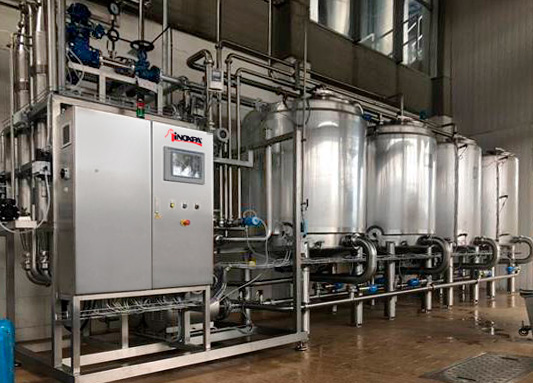Case studies: Optimal cleaning of a dairy process
 Customer
Customer
Dairy processing company with headquarters in the city of Bogota, Colombia.
 Project
Project
The customer was using a slow and expensive cleaning system during the production process.
Their CIP equipment was mainly manually operated and only had one line. This slowed the process down and derived in high chemical product and water use.

The customer wanted both a technical solution and a reliable provider that ensured good after-sales support
The customer wanted both a technical solution and a reliable provider that ensured good after-sales support
 Why INOXPA?
Why INOXPA?
The customer wanted both a technical solution and a reliable provider that ensured good after-sales support. Other companies in Colombia had provided positive feedback about their experience with INOXPA based on the quality of their equipment and their installation service.
INOXPA has extensive experience in CIP systems, having manufactured more than 100 CIP units over the past 6 years. These were sold and installed around the world in both South America and European countries such as Spain, Portugal, France, and Germany, among others.
 Installation characteristics
Installation characteristics
4 x 2000 L tanks were used for this CIP system, including 2 x 28 m3/hour lines. The fully automatic system uses tubular heat exchangers, one for each line.
The installation comprises the following components:
- 2 x tubular heat exchangers
- 2 x flow meters
- 2 x conductivity meters
- 2 x ASPIR A-150 self-priming pumps
- 3 x manhole-type covers, adapted with spray balls for tanker truck cleaning.
 Special features
Special features
Now with our CIP unit, the operation is fully automatic, with two lines to enable simultaneous cleaning of both production lines.
This has streamlined the use of resources, providing savings on both chemical products and water. This system has enabled the customer to reduce the cleaning time and costs.
Using an automatic system is key for achieving the highest efficiency, since it means that chemical products are used to required concentration.
Each product type requires the right concentration, so manually adding chemical products is ineffective. A longer cleaning time is required if the concentration is too low. Chemical products are overused if the concentration is too high.
In this case, conductivity meters and dosing pumps were included to precisely measure the required amount when adding the chemical products, automatically evaluating each situation’s requirements for the highest possible savings.
A recovered water tank was also installed that reduces consumption and contributes to considerable water saving.
Lastly and to prevent operatives from entering the tanks, special covers for cleaning truck tankers were fitted.
Request information
Optimal cleaning of a dairy process



